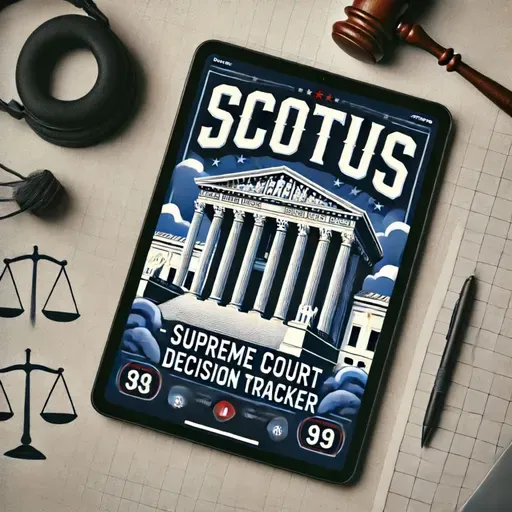
05 September 2025
Supreme Court Battles: Tariffs, Immigration, and the Limits of Presidential Power
Supreme Court Tracker - SCOTUS News
About
Listeners, over the past few days, the US Supreme Court has been front and center in major legal and political battles, particularly due to ongoing cases affecting presidential powers, immigration, and international trade.
The Trump administration’s economic agenda is at stake as President Trump has just asked the Supreme Court to step in quickly and review a recent federal appeals court decision that struck down many of his signature tariffs. The ruling determined that Trump overstepped his authority under the International Emergency Economic Powers Act when he imposed sweeping tariffs on America’s trading partners, both as a measure to address trade deficits and in response to the influx of fentanyl. According to News9, the administration has urged the court to rule by next week, emphasizing the urgency due to market instability and ongoing negotiations with foreign governments. The White House asserts that if the court allows the appeals decision to stand, it could unravel existing trade agreements, force America to repay billions in tariffs, and deal a significant blow to the president's ability to respond to foreign threats and conduct diplomacy.
Another major headline centers on the aftermath of the Court’s spring decision involving the wrongful deportation of Salvadoran national Ábrego García. SCOTUSblog highlights how the Supreme Court unanimously ordered federal officials to bring him back to the country after he was mistakenly deported, clarifying federal obligations in cases of administrative error. Since his return and subsequent legal battles, the broader issue of executive deportation powers remains fiercely contested, and the case illustrates the real-world impact of Supreme Court intervention.
Immigration, executive authority, and judicial checks are recurring themes, especially as the Court continues to confront the limits of presidential power. Earlier in the term, the Court issued decisions limiting some emergency powers but also, as documented by the US Studies Centre, notably sided with the president in expedited emergency applications—often without full briefing or explanation—allowing the administration to move ahead on critical issues like deportations and removals of independent federal agency heads.
Looking forward, listeners should expect more rapid-fire decisions on these high-profile disputes, as the Trump administration has pushed for expedited Supreme Court timelines. Both advocates and critics agree that the Court’s balance of power, use of its emergency “shadow docket,” and willingness to influence major policy areas will remain contentious political issues as the presidential term progresses.
Thank you for tuning in, and make sure to subscribe for continuous Supreme Court coverage and analysis. This has been a Quiet Please production, for more check out quietplease dot ai.
For more http://www.quietplease.ai
Get the best deals https://amzn.to/3ODvOta
The Trump administration’s economic agenda is at stake as President Trump has just asked the Supreme Court to step in quickly and review a recent federal appeals court decision that struck down many of his signature tariffs. The ruling determined that Trump overstepped his authority under the International Emergency Economic Powers Act when he imposed sweeping tariffs on America’s trading partners, both as a measure to address trade deficits and in response to the influx of fentanyl. According to News9, the administration has urged the court to rule by next week, emphasizing the urgency due to market instability and ongoing negotiations with foreign governments. The White House asserts that if the court allows the appeals decision to stand, it could unravel existing trade agreements, force America to repay billions in tariffs, and deal a significant blow to the president's ability to respond to foreign threats and conduct diplomacy.
Another major headline centers on the aftermath of the Court’s spring decision involving the wrongful deportation of Salvadoran national Ábrego García. SCOTUSblog highlights how the Supreme Court unanimously ordered federal officials to bring him back to the country after he was mistakenly deported, clarifying federal obligations in cases of administrative error. Since his return and subsequent legal battles, the broader issue of executive deportation powers remains fiercely contested, and the case illustrates the real-world impact of Supreme Court intervention.
Immigration, executive authority, and judicial checks are recurring themes, especially as the Court continues to confront the limits of presidential power. Earlier in the term, the Court issued decisions limiting some emergency powers but also, as documented by the US Studies Centre, notably sided with the president in expedited emergency applications—often without full briefing or explanation—allowing the administration to move ahead on critical issues like deportations and removals of independent federal agency heads.
Looking forward, listeners should expect more rapid-fire decisions on these high-profile disputes, as the Trump administration has pushed for expedited Supreme Court timelines. Both advocates and critics agree that the Court’s balance of power, use of its emergency “shadow docket,” and willingness to influence major policy areas will remain contentious political issues as the presidential term progresses.
Thank you for tuning in, and make sure to subscribe for continuous Supreme Court coverage and analysis. This has been a Quiet Please production, for more check out quietplease dot ai.
For more http://www.quietplease.ai
Get the best deals https://amzn.to/3ODvOta